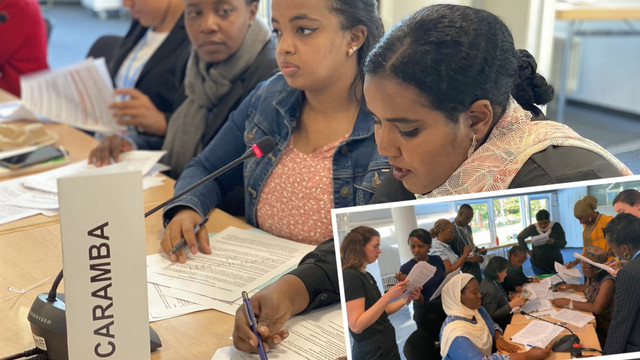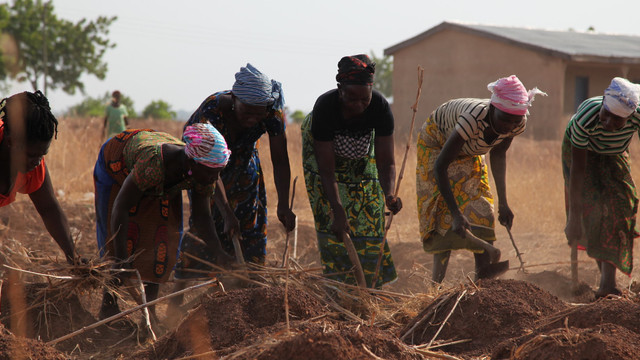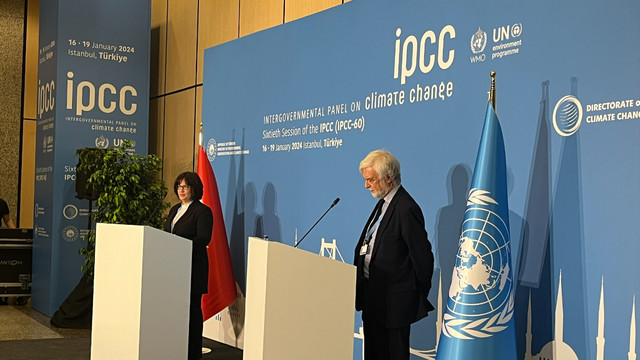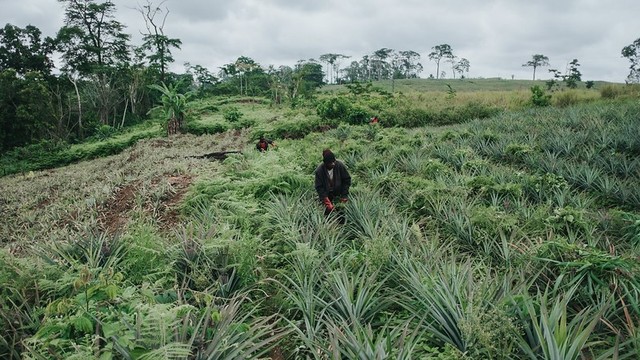Interview: Women from least developed countries and the international climate negotiations − how can we close the gap?
The first woman to chair the LDC Group in UNFCCC negotiations, Madeleine Diouf Sarr discusses what is needed to enable greater representation of women from the least developed countries in international climate decision-making spaces
Madeleine Diouf Sarr is the first woman to chair the Least Developed Countries (LDCs) Group since it began negotiating as a bloc within the UN Framework Convention on Climate Change (UNFCCC) negotiations, over 20 years ago. Low representation of women in climate negotiating delegations is widely documented, and delegations from the least developed countries in particular struggle to achieve gender balance.

Madeleine Diouf Sarr is the chair of the Least Developed Countries Group
As part of research from IIED and partners to examine the barriers preventing women from the least developed countries from participating in the negotiations, we talked to Madeleine Diouf Sarr about factors contributing to these imbalances. In this interview she discusses the action needed for more women from the least developed countries to represent their nations within international climate decision-making spaces.
Q: Why are women so underrepresented in the UNFCCC?
MDS: It is parties to the UNFCCC that nominate delegates to represent their countries. So the low participation of women in the UN climate negotiations, and the related processes that impact how the world responds to climate change, need to be explored at national level. This includes working with national focal points – those responsible for nominating negotiators and experts to attend negotiations, workshops and training sessions − to help bring a country-level commitment to including an equal number of women in delegations.
Training is a key point. Currently, not enough is being done at national level to train women, to build their capacities so they can take on positions within the UNFCCC. Lack of training is a major reason why we see women so underrepresented.
I do see progress. Gradually, more women from the least developed countries are being trained, for example with the IFDD (Institut de la Fancophonie pour le Développement Durable). But you still see major imbalances in some areas. This is particularly the case in areas that are deemed more ‘technical’.
For example, in the teams reporting on countries’ greenhouse gas inventories, there are many more men than women. Technical training needed for these specialist roles needs to be extended to women – so that means making sure women are informed about the relevant workshops, nominating them to attend, encouraging them to apply. Getting experience at national level is a really valuable starting point.
I see a clear link to women taking on roles at national level and women representing their countries at international level. National-level roles such as being part of the team coordinating a country’s national communication report on how that country is doing in terms of adaptation, implementing adaption projects on the ground, or helping to conduct a country’s greenhouse gas inventory – all these are UNFCCC requirements.
By implementing these UNFCCC requirements, you build up an understanding of what needs to be negotiated at international level from your country’s point of view. When you know what climate-related problems your country faces, you can work out where the gaps are, you get a better idea of where the red lines will be in the negotiations – what can be compromised on, and what can’t. All the knowledge and experience acquired at national level is applicable at the international level.
Q: Why is equal representation of women in the UNFCCC so important?
MDS: There is plenty of evidence showing that women are more vulnerable to the impacts of climate change.
Women are often deeply connected to ecosystems and nature. They rely heavily on natural resources − for example, water, food and fuelwood − for their livelihoods, and they play a key role in agricultural production. Most of their income comes from nature. And women face the impact of climate changes most directly – less food for their families due to crop failure, more time spent collecting or harvesting water, more time finding fuelwoods for the household and most affected by climate disasters (floods events with health risk).
Arguably more than any other group, women understand why strong outcomes at the climate negotiations are so critical; they understand why we need more ambition on reducing emissions and more ambition on adaptation actions.
It is why we need women to be represented at the climate negotiations. We need to draw on their innovation and knowledge, that comes so directly from the ground, to be embedded into climate decision-making processes, and to feed into solutions.
Q: Are there enough women in senior international positions within the UNFCCC?
MDS: Certainly, there are women in senior positions within the UNFCCC and there are more and more women heading up delegations. So, the opportunities within the UNFCCC are there.
For me, women positioning themselves to be able to take on senior roles at international level is closely linked to building up knowledge and getting to know how the UNFCCC process works. And a lot of this knowledge can be built up through roles at national level. This brings me back to the point about sufficient training, so women can build up their knowledge and skills around specific areas.
But women also need to know they have the support and encouragement of their peers, particularly those in senior positions. My director championed me, and I benefitted hugely from this. It encouraged me to take on various roles within my own country, each time increasingly in levels of seniority. This led to taking on roles at international level and eventually to chair of the LDC negotiating group.
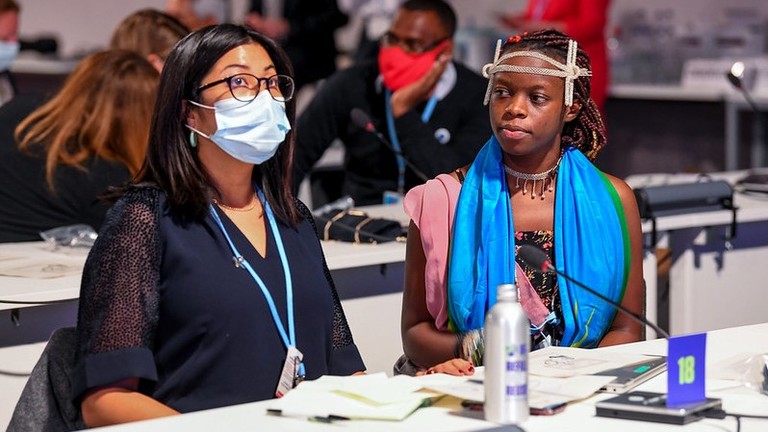
Delegates attend a loss and damage event at COP26 in Scotland in 2021. More action is needed to achieve an increased gender balance in international climate decision-making (Photo: Justin Goff/ UK government, via Flickr, CC BY-NC-ND 2.0)
Q: Women from the least developed countries are less well represented in the climate negotiations than those from other developing countries. Do you see any barriers for women from LDCs?
MDS: A major issue here is one of resource. The least developed countries are the world’s poorest nations and have disproportionately less resources. It’s inevitable that the disadvantages LDCs face will be reflected in their participation at the UNFCCC and indeed the representation of women.
And the underrepresentation of women is a broader issue running across the whole of society – much wider than only the UNFCCC. Across the LDCs there are fewer women working in government and this has knock-on effects for the climate delegations of those countries – since national delegations are mainly made up of civil servants and experts working in ministries and other governmental agencies within each country.
Q: Resource pressures within LDCs can limit the number of places available within delegations. Could this add to the challenge of women being included?
MDS: The LDCs recognise that our strongest national delegations are made up of people with the right training, who have the right technical knowledge and are experienced in negotiating spaces. For me, the focus isn’t on places available for women and places available for men. For me, the focus should be on increasing the size of our delegations overall and sending out our strongest teams – which of course means an even balance of women and men.
Having more trained women at national level and holding positions within their governments will greatly contribute to more gender balanced delegations. Size and strength is what we should be focusing on; this is what we should be advocating for.
Q: Did you receive any mentoring? Did you have any women mentors?
MDS: I started out as a junior negotiator. And I’d just like to give mention to all the great work IIED does to train up young delegates in their climate negotiating skills – it’s so important to build up the knowledge and skills of young people to get them into UNFCCC processes early on.
As a junior negotiator with my national delegation I was mentored by women and men. My director was a woman. I have a particular memory of making a trip to Latin America to attend a meeting on integrating land use, land-use change and forestry (LULUCF) activities into the Kyoto Protocol. It was a big meeting, a very tough meeting – and there were very few women there.
I came back and spoke to my director, and I remember being so grateful to be able to relay the challenges of the trip and particularly the struggle of being completely outnumbered by men.
So, yes, as a woman, being mentored by women in senior positions really helps. In part to be able to share frustrations, but also to receive encouragement from women who have the experience, who have made their way on that path before you. Their advice and encouragement can shape your journey and to give you the courage to move forward when things are tough.
